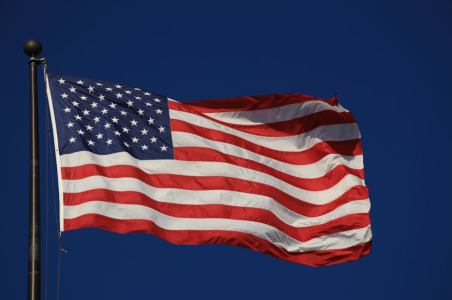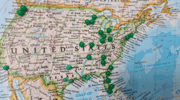The surprising origins of these 20 state nicknames
- Replies 0
There are moments when something simple can hold far more meaning than it seems at first glance. A few words, a phrase, or even a nickname can say more about history, pride, and identity than entire books.
When people use these phrases, they are unknowingly carrying traditions that stretch back generations. This is where curiosity meets heritage, and sometimes even a little mystery that refuses to fade away.
Nicknames are not just surface-level labels; they are living artifacts that carry stories of settlement, war, culture, and even natural wonders. Each state has a name that speaks in ways official titles often do not, drawing from events that happened hundreds of years ago or quirks unique to that region.
Sometimes they are the result of legislative action, while in other cases they grew naturally from what outsiders and locals said most often. The story of how they came to be is as layered and unexpected as the states themselves.
Alabama—The Heart of Dixie
The most widely known nickname for Alabama is “The Heart of Dixie,” a phrase that took root in the mid-20th century with support from the Alabama Chamber of Commerce. It highlighted the state’s place at the cultural center of the Deep South, reinforcing an identity tied to history and tradition. Earlier nicknames such as “The Cotton State” or “The Yellowhammer State” also reflected the region’s agriculture and local symbols. Today, the nickname still appears on license plates and serves as a lasting reminder of how identity is both chosen and inherited.
Alaska—The Last Frontier
Alaska earned its title as “The Last Frontier” because of its sheer size, remote wilderness, and sense of uncharted possibility. The phrase reflects how the state has long been seen as America’s final push toward discovery, a land that remains rugged and untamed. Its official motto, “North to the Future,” adds to this sense of promise and expansion. Together, the motto and nickname reinforce Alaska’s reputation as a land defined by both challenge and opportunity.
Arizona—The Grand Canyon State
Arizona’s nickname leaves little mystery, as the state is home to one of the most breathtaking natural landmarks in the world. The Grand Canyon stretches for hundreds of miles, with depths reaching thousands of feet and vistas that leave visitors awestruck. The phrase became official in the early 20th century, aligning with Arizona’s admission to the Union in 1912. It is a nickname rooted in geography, yet it speaks volumes about pride in what nature created there.
Arkansas—The Natural State
The Arkansas legislature officially adopted “The Natural State” in 1995, a conscious effort to promote the state’s beauty and outdoor appeal. With three national forests, five national parks, and dozens of state parks, the name captures the richness of its landscapes. Older nicknames like “The Bear State” and “The Land of Opportunity” faded as tourism took priority. Today the nickname resonates not just as marketing but as a statement about what residents value most about their home.
California—The Golden State
California’s official nickname, adopted in 1968, ties directly to its famous Gold Rush of 1848 and the golden poppies that cover its hills each spring. The name reflects both natural beauty and historic turning points that changed the course of the nation. Its state motto, “Eureka,” meaning “I have found it,” has been official since 1963 and connects directly to the discovery of gold. The nickname has since come to symbolize opportunity, growth, and innovation in the modern era.
Colorado—The Centennial State
Colorado became known as “The Centennial State” because it joined the Union in 1876, exactly 100 years after the Declaration of Independence. This unique timing gave the state a nickname that is both historical and patriotic. The name Colorado itself comes from the Spanish word for “colored red,” a nod to its striking landscapes. Both the nickname and state name together reflect a place steeped in symbolism and history.
Connecticut—The Constitution State
In 1959, Connecticut’s General Assembly officially adopted the nickname “The Constitution State.” The title traces back to the Fundamental Orders of 1638 and 1639, which some historians, such as John Fiske, considered the first written constitution in history. Other nicknames like “The Nutmeg State” and “The Provisions State” also have roots in trade and Revolutionary War contributions. Yet it is the constitutional connection that remains strongest, linking Connecticut to America’s founding principles.
Delaware—The First State
On December 7, 1787, Delaware became the very first of the thirteen colonies to ratify the U.S. Constitution, giving rise to the nickname “The First State.” Though widely used for centuries, it did not become official until 2002, after a petition by a first-grade class in Wilmington. Other nicknames, such as “Small Wonder” and “The Diamond State,” have also been used, reflecting its small size but strategic importance. Still, “The First State” stands apart because of the history it represents.
Florida—The Sunshine State
Florida was officially designated “The Sunshine State” in 1970, though the nickname had been popular long before. Its warm climate and abundant sunshine made the name an easy fit, especially as tourism grew to dominate the state’s economy. The very word “Florida” comes from the Spanish “Pascua Florida,” or “Feast of Flowers,” named by explorer Juan Ponce de León. With its subtropical weather and vibrant coastlines, the nickname captures both natural appeal and cultural identity.
Georgia—The Peach State
Georgia’s nickname highlights its reputation for producing sweet, high-quality peaches, even though the state also grows a wide variety of crops. Adopted informally in the 19th century, the nickname is reinforced by the peach as the state fruit and the numerous Peachtree streets found across its cities. The fruit’s symbolic link to hospitality and abundance further strengthened the association. Over time, the Peach State became shorthand for Georgia’s agricultural pride and regional flavor.
Also read: A bite of America: 50 iconic dishes that define every US state
Hawaii—The Aloha State
When Hawaii became the 50th state in 1959, the legislature officially declared it “The Aloha State.” The word “aloha,” which means both “hello” and “goodbye,” is deeply embedded in Hawaiian culture and language. Each island also carries its own unique nickname, from the Big Island to the Valley Isle. Collectively, the title reflects both cultural identity and a spirit of warmth that the state wishes to project to the world.
Idaho—The Gem State
Idaho’s nickname reflects its vast natural resources, particularly its gemstones, including star garnets, opals, and jade. Early on, people mistakenly believed “Idaho” was a Shoshone word meaning “Gem of the Mountain,” though it later turned out not to be true. Still, the legend stuck, and Idaho embraced its connection to the earth’s riches. Today, it remains the only state where star garnets are found in significant quantities.
Illinois—The Prairie State
Illinois has been referred to as “The Prairie State” since at least the mid-19th century. The nickname acknowledges the state’s flat, grassy landscapes, shaped by glaciers and stretching across much of its land. More recently, “Land of Lincoln” has also been widely promoted, honoring Abraham Lincoln’s legacy. Yet “The Prairie State” continues to endure, carrying with it echoes of the state’s natural character.
Indiana—The Hoosier State
The word “Hoosier” has been associated with Indiana since the early 19th century, though its exact origins are debated. The name gained wider recognition after John Finley’s 1833 poem “The Hoosier’s Nest” was published in the Indianapolis Journal. By the end of that decade, “The Hoosier State” was being used in speeches and celebrations, cementing its status. Today, Indiana residents proudly embrace the nickname despite the lingering mystery behind its meaning.
Iowa—The Hawkeye State
Iowa’s nickname is believed to honor a character named Hawkeye from James Fenimore Cooper’s 1826 novel The Last of the Mohicans. Two men promoting the state popularized the term in the 1830s, and it was adopted as official in 1838. While Iowa is also known for corn production, “The Hawkeye State” carried a sense of identity that went beyond agriculture. It reflected pride, resilience, and connection to both literature and legacy.
Also read: 17 American wonders that remind you why nature still takes your breath away
Kansas—The Sunflower State
Kansas adopted the sunflower as its state flower in 1903, and its nickname “The Sunflower State” naturally followed. The flower’s abundance across the state made it a fitting symbol of both natural beauty and agricultural heritage. Other nicknames like “The Jayhawker State” and “The Breadbasket of the World” were also tied to war history and wheat production. Still, the sunflower remains the enduring emblem that most residents associate with Kansas today.
Kentucky—The Bluegrass State
Kentucky became known as “The Bluegrass State” due to the bluish tinge of its grass when left to grow tall. Early settlers recognized its distinct look and marketed seeds as bluegrass, helping the nickname spread. The term eventually became tied to the region’s famous Bluegrass music and rolling landscapes. Together, these associations have given Kentucky a cultural identity that resonates far beyond its borders.
Louisiana—The Pelican State
Louisiana’s nickname honors the brown pelican, a bird unique to its coastline and depicted on its state flag and seal. The pelican became a symbol of care and sacrifice, with early depictions showing the bird feeding its young. As a result, the nickname “The Pelican State” resonated both with natural heritage and symbolic meaning. The image is still used today, appearing on everything from license plates to commemorative quarters.
Maine—The Pine Tree State
Maine officially adopted “The Pine Tree State” as its nickname because of the abundance of white pine forests across its landscape. Pine trees are deeply tied to the state’s economy, culture, and even its flag. Other nicknames like “Vacationland” have also been used to highlight tourism. Yet the enduring image of the pine tree continues to define Maine’s sense of self.
Maryland—The Old Line State
Maryland earned the nickname “The Old Line State” during the Revolutionary War, when General George Washington praised the state’s courageous troops. The “Maryland Line” was known for its discipline and bravery, and the phrase became part of the state’s legacy. Later nicknames like “The Free State” reflected Maryland’s decision to abolish slavery in 1864. Still, “The Old Line State” remains the one most deeply tied to both history and honor.
Read next: Step back in time: The oldest restaurant in every US State

Nicknames might seem like a small detail, but they tell us much more than most realize. Which of these early twenty states surprised you the most with the story behind its title, and do you think your own state’s nickname fits its character? Share your thoughts in the comments below, and let’s see which nickname sparks the most debate.
When people use these phrases, they are unknowingly carrying traditions that stretch back generations. This is where curiosity meets heritage, and sometimes even a little mystery that refuses to fade away.
Nicknames are not just surface-level labels; they are living artifacts that carry stories of settlement, war, culture, and even natural wonders. Each state has a name that speaks in ways official titles often do not, drawing from events that happened hundreds of years ago or quirks unique to that region.
Sometimes they are the result of legislative action, while in other cases they grew naturally from what outsiders and locals said most often. The story of how they came to be is as layered and unexpected as the states themselves.
Alabama—The Heart of Dixie
The most widely known nickname for Alabama is “The Heart of Dixie,” a phrase that took root in the mid-20th century with support from the Alabama Chamber of Commerce. It highlighted the state’s place at the cultural center of the Deep South, reinforcing an identity tied to history and tradition. Earlier nicknames such as “The Cotton State” or “The Yellowhammer State” also reflected the region’s agriculture and local symbols. Today, the nickname still appears on license plates and serves as a lasting reminder of how identity is both chosen and inherited.
Alaska—The Last Frontier
Alaska earned its title as “The Last Frontier” because of its sheer size, remote wilderness, and sense of uncharted possibility. The phrase reflects how the state has long been seen as America’s final push toward discovery, a land that remains rugged and untamed. Its official motto, “North to the Future,” adds to this sense of promise and expansion. Together, the motto and nickname reinforce Alaska’s reputation as a land defined by both challenge and opportunity.
Arizona—The Grand Canyon State
Arizona’s nickname leaves little mystery, as the state is home to one of the most breathtaking natural landmarks in the world. The Grand Canyon stretches for hundreds of miles, with depths reaching thousands of feet and vistas that leave visitors awestruck. The phrase became official in the early 20th century, aligning with Arizona’s admission to the Union in 1912. It is a nickname rooted in geography, yet it speaks volumes about pride in what nature created there.
Arkansas—The Natural State
The Arkansas legislature officially adopted “The Natural State” in 1995, a conscious effort to promote the state’s beauty and outdoor appeal. With three national forests, five national parks, and dozens of state parks, the name captures the richness of its landscapes. Older nicknames like “The Bear State” and “The Land of Opportunity” faded as tourism took priority. Today the nickname resonates not just as marketing but as a statement about what residents value most about their home.
California—The Golden State
California’s official nickname, adopted in 1968, ties directly to its famous Gold Rush of 1848 and the golden poppies that cover its hills each spring. The name reflects both natural beauty and historic turning points that changed the course of the nation. Its state motto, “Eureka,” meaning “I have found it,” has been official since 1963 and connects directly to the discovery of gold. The nickname has since come to symbolize opportunity, growth, and innovation in the modern era.
Colorado—The Centennial State
Colorado became known as “The Centennial State” because it joined the Union in 1876, exactly 100 years after the Declaration of Independence. This unique timing gave the state a nickname that is both historical and patriotic. The name Colorado itself comes from the Spanish word for “colored red,” a nod to its striking landscapes. Both the nickname and state name together reflect a place steeped in symbolism and history.
Connecticut—The Constitution State
In 1959, Connecticut’s General Assembly officially adopted the nickname “The Constitution State.” The title traces back to the Fundamental Orders of 1638 and 1639, which some historians, such as John Fiske, considered the first written constitution in history. Other nicknames like “The Nutmeg State” and “The Provisions State” also have roots in trade and Revolutionary War contributions. Yet it is the constitutional connection that remains strongest, linking Connecticut to America’s founding principles.
Delaware—The First State
On December 7, 1787, Delaware became the very first of the thirteen colonies to ratify the U.S. Constitution, giving rise to the nickname “The First State.” Though widely used for centuries, it did not become official until 2002, after a petition by a first-grade class in Wilmington. Other nicknames, such as “Small Wonder” and “The Diamond State,” have also been used, reflecting its small size but strategic importance. Still, “The First State” stands apart because of the history it represents.
Florida—The Sunshine State
Florida was officially designated “The Sunshine State” in 1970, though the nickname had been popular long before. Its warm climate and abundant sunshine made the name an easy fit, especially as tourism grew to dominate the state’s economy. The very word “Florida” comes from the Spanish “Pascua Florida,” or “Feast of Flowers,” named by explorer Juan Ponce de León. With its subtropical weather and vibrant coastlines, the nickname captures both natural appeal and cultural identity.
Georgia—The Peach State
Georgia’s nickname highlights its reputation for producing sweet, high-quality peaches, even though the state also grows a wide variety of crops. Adopted informally in the 19th century, the nickname is reinforced by the peach as the state fruit and the numerous Peachtree streets found across its cities. The fruit’s symbolic link to hospitality and abundance further strengthened the association. Over time, the Peach State became shorthand for Georgia’s agricultural pride and regional flavor.
Also read: A bite of America: 50 iconic dishes that define every US state
Hawaii—The Aloha State
When Hawaii became the 50th state in 1959, the legislature officially declared it “The Aloha State.” The word “aloha,” which means both “hello” and “goodbye,” is deeply embedded in Hawaiian culture and language. Each island also carries its own unique nickname, from the Big Island to the Valley Isle. Collectively, the title reflects both cultural identity and a spirit of warmth that the state wishes to project to the world.
Idaho—The Gem State
Idaho’s nickname reflects its vast natural resources, particularly its gemstones, including star garnets, opals, and jade. Early on, people mistakenly believed “Idaho” was a Shoshone word meaning “Gem of the Mountain,” though it later turned out not to be true. Still, the legend stuck, and Idaho embraced its connection to the earth’s riches. Today, it remains the only state where star garnets are found in significant quantities.
Illinois—The Prairie State
Illinois has been referred to as “The Prairie State” since at least the mid-19th century. The nickname acknowledges the state’s flat, grassy landscapes, shaped by glaciers and stretching across much of its land. More recently, “Land of Lincoln” has also been widely promoted, honoring Abraham Lincoln’s legacy. Yet “The Prairie State” continues to endure, carrying with it echoes of the state’s natural character.
Indiana—The Hoosier State
The word “Hoosier” has been associated with Indiana since the early 19th century, though its exact origins are debated. The name gained wider recognition after John Finley’s 1833 poem “The Hoosier’s Nest” was published in the Indianapolis Journal. By the end of that decade, “The Hoosier State” was being used in speeches and celebrations, cementing its status. Today, Indiana residents proudly embrace the nickname despite the lingering mystery behind its meaning.
Iowa—The Hawkeye State
Iowa’s nickname is believed to honor a character named Hawkeye from James Fenimore Cooper’s 1826 novel The Last of the Mohicans. Two men promoting the state popularized the term in the 1830s, and it was adopted as official in 1838. While Iowa is also known for corn production, “The Hawkeye State” carried a sense of identity that went beyond agriculture. It reflected pride, resilience, and connection to both literature and legacy.
Also read: 17 American wonders that remind you why nature still takes your breath away
Kansas—The Sunflower State
Kansas adopted the sunflower as its state flower in 1903, and its nickname “The Sunflower State” naturally followed. The flower’s abundance across the state made it a fitting symbol of both natural beauty and agricultural heritage. Other nicknames like “The Jayhawker State” and “The Breadbasket of the World” were also tied to war history and wheat production. Still, the sunflower remains the enduring emblem that most residents associate with Kansas today.
Kentucky—The Bluegrass State
Kentucky became known as “The Bluegrass State” due to the bluish tinge of its grass when left to grow tall. Early settlers recognized its distinct look and marketed seeds as bluegrass, helping the nickname spread. The term eventually became tied to the region’s famous Bluegrass music and rolling landscapes. Together, these associations have given Kentucky a cultural identity that resonates far beyond its borders.
Louisiana—The Pelican State
Louisiana’s nickname honors the brown pelican, a bird unique to its coastline and depicted on its state flag and seal. The pelican became a symbol of care and sacrifice, with early depictions showing the bird feeding its young. As a result, the nickname “The Pelican State” resonated both with natural heritage and symbolic meaning. The image is still used today, appearing on everything from license plates to commemorative quarters.
Maine—The Pine Tree State
Maine officially adopted “The Pine Tree State” as its nickname because of the abundance of white pine forests across its landscape. Pine trees are deeply tied to the state’s economy, culture, and even its flag. Other nicknames like “Vacationland” have also been used to highlight tourism. Yet the enduring image of the pine tree continues to define Maine’s sense of self.
Maryland—The Old Line State
Maryland earned the nickname “The Old Line State” during the Revolutionary War, when General George Washington praised the state’s courageous troops. The “Maryland Line” was known for its discipline and bravery, and the phrase became part of the state’s legacy. Later nicknames like “The Free State” reflected Maryland’s decision to abolish slavery in 1864. Still, “The Old Line State” remains the one most deeply tied to both history and honor.
Read next: Step back in time: The oldest restaurant in every US State
Key Takeaways
- Every state nickname carries with it a mix of folklore, legislation, and tradition that speaks volumes about identity.
- Some names reflect geography and natural beauty, while others tie directly to war, politics, and social change.
- The evolution of these nicknames shows how culture adapts over time but still preserves threads of the past.
- Together, they form a narrative tapestry that reveals how Americans see themselves and their history, one state at a time.







